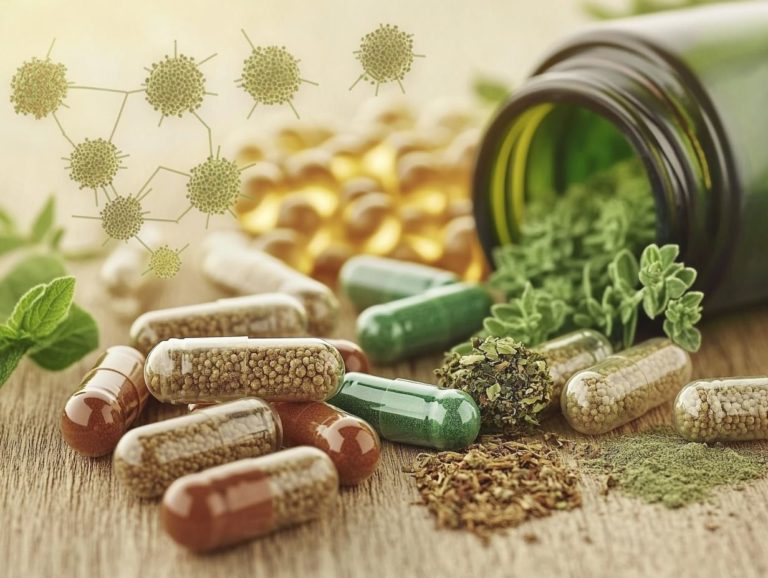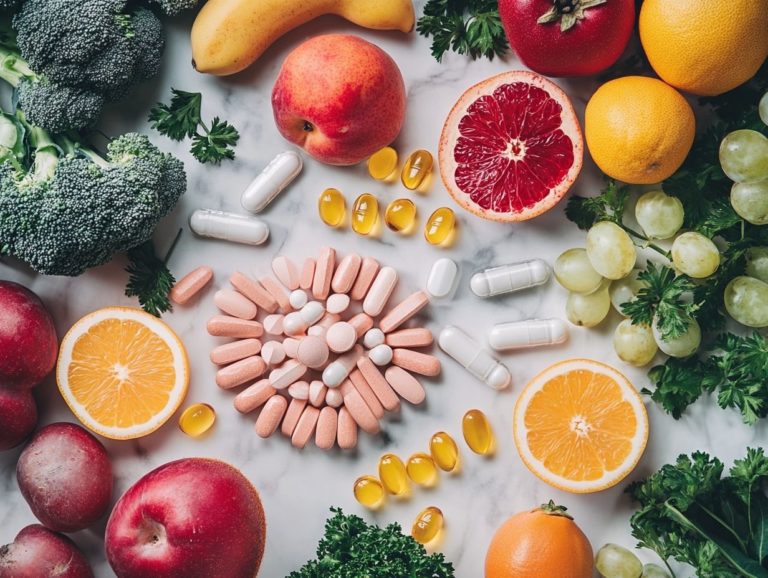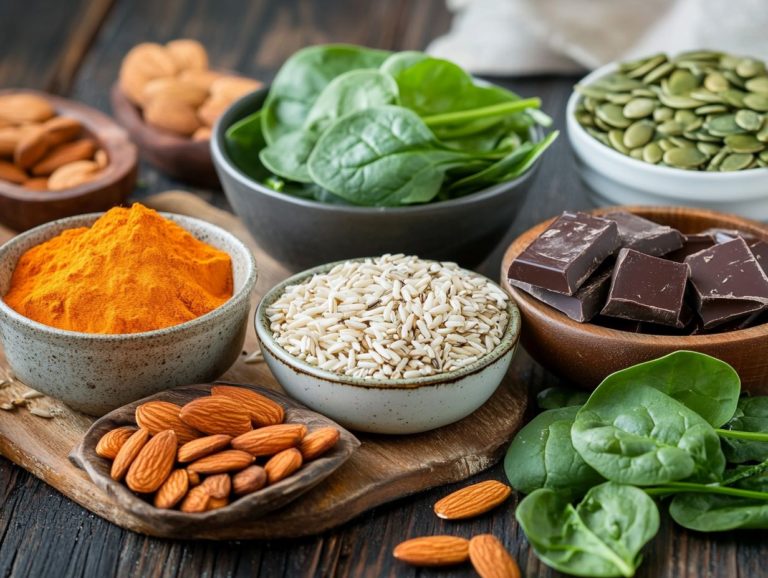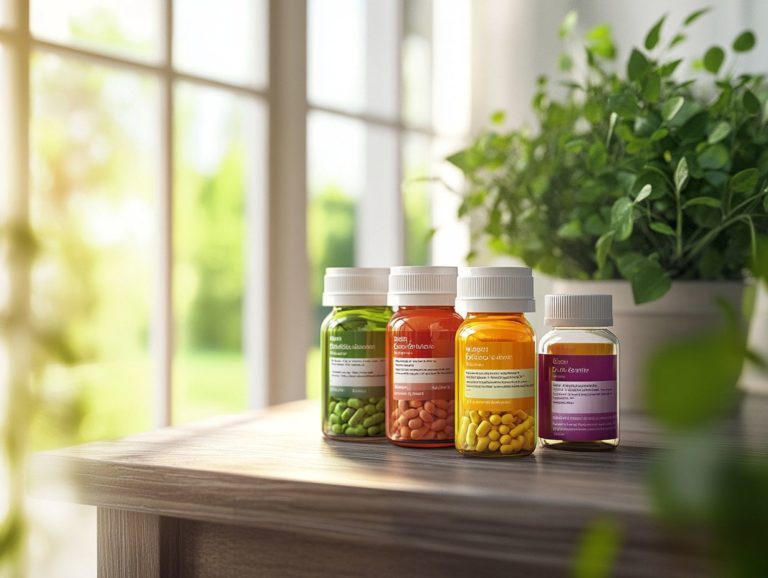Potential Interactions: Supplements and Medications
Navigating the realm of medications and supplements can indeed be complex. It’s important to decipher their interactions.
Understanding drug interactions is crucial, as they can have significant implications for your health. It s essential to be aware of which combinations may present potential risks.
This article delves into the topic of drug interactions, shedding light on common supplements and medications. It will pinpoint specific combinations you should be cautious of.
You ll also discover best practices to minimize risks and learn when it s wise to consult healthcare professionals.
Staying informed is your strongest weapon against unexpected health issues!
Contents
- Key Takeaways:
- Understanding Drug Interactions
- Common Supplements and Medications
- Potential Interactions to be Aware Of
- How to Minimize Risks of Interactions
- When to Consult a Healthcare Professional
- Frequently Asked Questions
- What are potential interactions between supplements and medications?
- Why is it important to be aware of potential interactions?
- What are some common supplements and medications that may interact?
- Can interactions between supplements and medications be avoided?
- What should I do if I am already taking supplements and medications together?
- Are there any resources available to check for potential interactions?
Key Takeaways:

Be aware of potential interactions between supplements and medications. This awareness can protect your health.
Consult with a healthcare professional before taking any new supplements or medications. This can minimize the risks of interactions.
Pay attention to specific combinations of supplements and medications that can have adverse effects. Watch out for signs and symptoms of interactions.
Understanding Drug Interactions
Understanding drug interactions is essential for anyone taking prescription medications, herbal supplements, or dietary aids. This is especially true when considering how drugs move and work in your body. These interactions can profoundly impact drug metabolism, leading to unintended consequences, particularly for those with chronic conditions.
It’s vital for you to be aware of how various substances such as St. John’s wort, American ginseng, and ginkgo biloba can affect the efficacy and safety of your prescribed therapies.
What are Drug Interactions?
Drug interactions happen when one substance alters the effects of another, either boosting or diminishing its effectiveness. In the realm of pharmacokinetic interactions, one drug can influence the absorption, distribution, metabolism, or excretion of another. This can tweak its blood levels and efficacy.
Take goldenseal, for instance. This dietary supplement is known to interfere with the metabolism of certain medications by inhibiting specific liver enzymes, which can lead to heightened concentrations of drugs in your body.
On the flip side, pharmacodynamic interactions occur when drugs target the same biological pathways. This can result in either additive effects or opposing responses. A clear example is black cohosh, which may amplify the effects of hormone-related therapies, raising valid concerns for individuals undergoing treatments for conditions like breast cancer.
Common Supplements and Medications
You may come across a range of dietary and herbal supplements, such as St. John’s wort, American ginseng, ginkgo biloba, goldenseal, and black cohosh. These are often taken in conjunction with prescription medications.
However, you must understand the potential interactions these supplements may have with your medications. Knowing these interactions can help you make informed choices about your health and ensure your well-being.
Overview of Popular Supplements and Medications

Popular supplements such as St. John’s wort, American ginseng, and ginkgo biloba have caught your eye for their potential health benefits. However, be aware! These benefits come with important risks when combined with prescription medications.
These herbal remedies have rich histories in traditional medicine. St. John’s wort is often celebrated for its mood-enhancing properties. American ginseng is known for providing an energy boost and stress relief. Ginkgo biloba supports cognitive function and memory.
St. John’s wort can interact negatively with antidepressants and birth control pills, potentially reducing their effectiveness. Ginkgo biloba may heighten the risk of bleeding, especially when paired with anticoagulants medications that help prevent blood clots like warfarin.
As recommended by the National Center for Complementary and Integrative Health, consult with healthcare professionals before adding any of these supplements to your regimen. This way, you can mitigate risks and ensure safety on your health journey.
Potential Interactions to be Aware Of
Potential drug interactions can emerge from using herbal supplements, which may amplify or diminish the effects of prescription medications. This can complicate treatment regimens and ultimately impact your safety as a patient.
It’s essential to be aware of these interactions to ensure a seamless and effective healthcare experience.
Specific Combinations to Watch Out For
Specific combinations, such as St. John’s wort with warfarin or ginkgo biloba with certain antidepressants, warrant careful attention. These combinations can alter both the effectiveness and safety of medications.
St. John’s wort can significantly reduce the blood-thinning effects of warfarin, increasing your risk of blood clots. Similarly, ginkgo biloba may amplify the side effects of selective serotonin reuptake inhibitors (SSRIs), which can lead to heightened anxiety and an array of other symptoms. Clinical trials reveal that interactions between these herbal supplements and prescription medications can result in unwanted side effects. Therefore, discuss any supplement regimens with your healthcare professionals.
By staying informed and proactive, you can enhance your health outcomes and safeguard yourself from detrimental interactions.
How to Minimize Risks of Interactions
To minimize the risks of drug interactions, adopting a patient-centered approach is crucial. This involves talking openly with your healthcare providers about all dietary supplements and medications you are using.
Best Practices for Taking Supplements and Medications
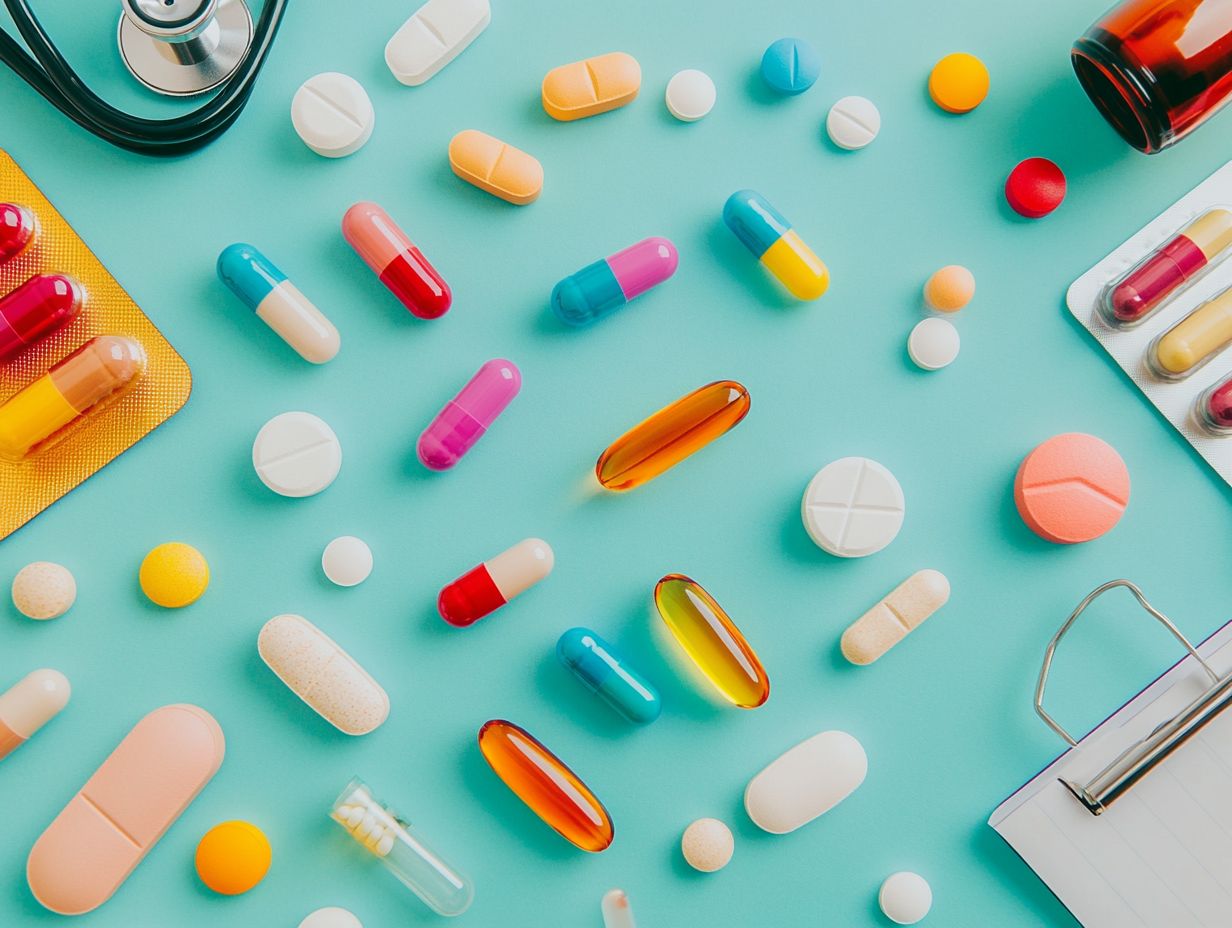
Adhering to best practices when incorporating dietary and herbal supplements alongside your prescription medications can significantly minimize the risk of adverse interactions.
This means consulting with healthcare providers who can offer personalized advice tailored to your unique health history. Timing is also essential; understanding when to take supplements in relation to your medications can enhance their absorption and overall effectiveness.
Being mindful of potential side effects or allergic reactions is crucial, as these can differ from one person to another. It s wise for you to educate yourself about the supplements you re considering, ensuring you select high-quality products while remaining informed about their benefits and risks.
When to Consult a Healthcare Professional
Consulting a healthcare professional is essential whenever you notice signs of drug interactions, especially when mixing prescription medications with herbal supplements. Your health deserves the utmost attention. A professional can provide the guidance necessary to navigate these complexities safely.
Take charge of your health talk to your healthcare provider today!
Signs and Symptoms of Interactions
Recognizing the signs of drug interactions is crucial for your health. This is especially true when using herbal supplements and prescription medications.
You may experience side effects like nausea, dizziness, or fatigue. These could signal an adverse interaction.
Watch for a drop in how well your prescribed treatments work. This might mean your symptoms are returning or worsening.
Talk to your healthcare provider right away if you notice these problems. They will help assess your situation and suggest changes to your medications.
Early conversations with your doctor can protect your well-being and improve your treatment outcomes.
Frequently Asked Questions
What are potential interactions between supplements and medications?

Interactions between supplements and medications happen when they affect each other. This can lead to reduced effectiveness or harmful side effects.
Why is it important to be aware of potential interactions?
Knowing about potential interactions can prevent harmful side effects. It also ensures that both your supplements and medications work effectively.
What are some common supplements and medications that may interact?
Common items that may interact include blood thinners (medications to prevent blood clots), antidepressants, cholesterol-lowering drugs, and pain relievers. Herbal supplements, vitamins, and minerals can also interact with some prescriptions.
Can interactions between supplements and medications be avoided?
You can sometimes avoid interactions by taking them at different times. Adjusting dosages may also help, but talk to your healthcare provider first.
What should I do if I am already taking supplements and medications together?
If you’re already combining supplements and medications, check in with your healthcare provider. They ll review your regimen for any potential issues.
Are there any resources available to check for potential interactions?
Yes, there are several resources to check for interactions. You can use online databases or drug interaction checkers, and always consult with a pharmacist or doctor before making changes.


